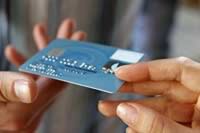Research reveals credit cards encourage spending
 Conventional wisdom says that people spend more when they use credit than when they use cash. But is it true? In The Money Answer Book, Dave Ramsey writes:
Conventional wisdom says that people spend more when they use credit than when they use cash. But is it true? In The Money Answer Book, Dave Ramsey writes:
When you pay in cash, you can “feel” the money leaving you. This is not true with credit cards. Flipping a card up on a counter registers nothing emotionally. If you use plastic instead of cash you will spend 12 percent to 18 percent more. This is money you could have saved.
Though he fails to cite his sources, Ramsey’s right — most people do spend more when they pay with credit. The September 2008 issue of the Journal of Experimental Psychology: Applied contains research into the effect of payment type on consumer behavior [free 268kb PDF of entire article]. From the press release:
The conclusion that cash discourages spending, and credit or gift cards encourage it, arises from four studies that examined two factors in purchasing behavior: when consumers part with their money (cash versus credit) and the form of payment (cash, cash-like scrip, gift certificate or credit card). The results build on growing evidence that, as the authors [Priya Raghubir and Joydeep Srivastava] wrote, “The more transparent the payment outflow, the greater the aversion to spending, or higher the ‘pain of paying.’” Cash is viewed as the most transparent form of payment.
In July, Ari Shapiro of NPR’s Morning Edition talked with Cornell economics professor Robert Frank about why people spend more when using credit instead of cash. Frank echoes Dave Ramsey: “Parting with [cash] is just a more vivid sensation than than abstract act of signing a pledge to pay sometime later in the future.”
During their conversation, Shapiro noted, “When McDonald’s started allowing credit card purchases, the average purchase went from $4.50 up to $7.00. That’s a huge increase.”
I couldn’t find numbers to support Shapiro’s claim; however, I did locate an article that quotes an executive from the company that installed McDonald’s credit-card processing systems. “When an establishment accepts credit cards, the average ticket size goes up,” he said. “We anticipate a 40 percent increase in the average ticket size for those franchises implementing credit card processing for the first time.”
Just being aware of the tendency to overspend with credit can help you apply the brakes. Here are other methods that work:
- Don’t use your credit card for luxuries. Use it only for things you need, like groceries or gasoline. I follow this rule religiously, and I believe it’s one of the reasons I’ve been able to avoid spending too much.
- Use your credit card only for big expenses. Kris doesn’t use her single credit card for small, spontaneous purchases such as a nephew’s birthday gift. Instead, she saves it for big purchases, like a food processor or a dishwasher. She approaches these pre-planned expenses differently, and isn’t likely to be lulled into spending too much just because she’s using credit.
- If you’re headed to a personal “trouble zone”, leave your credit card at home. Don’t take it with you to the mall, for example, if you know you’ll be tempted to use it.
- Don’t just look at your total bill — pay attention to the cost of each thing you’re buying. When you pay with credit or gift certificates, it’s easy to focus on the grand total instead of the cost of individual items.
Not everyone spends more with credit, of course. Some GRS readers report the opposite experience — they are stingier with credit than with cash. Either way, it’s in your best interest to know yourself and your spending weaknesses so that you control your expenses rather than being at the mercy of your environment.
Become A Money Boss And Join 15,000 Others
Subscribe to the GRS Insider (FREE) and we’ll give you a copy of the Money Boss Manifesto (also FREE)
